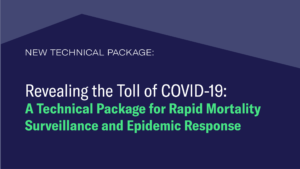Toward a World Where Everyone Counts
Civil Registration and Vital Statistics (CRVS) is the continuous, universal, timely, inclusive and compulsory recording of births, deaths and causes of death in the population. Fully functional CRVS systems also record marriages, divorces and adoptions—which are particularly important for women and children.
Why does this matter? After all, isn’t it only paperwork? It matters because in most countries the registration of a birth creates an individual’s legal identity. And that legal identity is the key to unlocking access to services, rights and protections that are otherwise out of reach to the unregistered. In addition, civil registration data forms the basis for essential vital statistics for use in policy, planning, and monitoring and evaluation of health and social policy impact. While advances have been made, much remains to be done, as illuminated in this New York Times Magazine cover story that highlights Vital’s work (read or listen here).
CRVS is the heartbeat of public health and development, and that’s why it matters—and why our program is dedicated to #CountingEveryone.
A World Where Everyone counts. That is the vision of the CRVS Program at Vital Strategies. Yet one in four births and about 40% of deaths worldwide are still not registered—and even when deaths are recorded, many have vague causes assigned such as “stopped breathing” or “heart failure,” or no cause at all.
The civil registration of births and deaths, including cause of death, offers basic benefits to both individuals and governments. Birth registration unlocks access to a host of rights, protections and services unavailable to those whose legal identity has not been established. Death registration benefits individuals by protecting survivors’ rights and legitimating inheritance.
For governments, reliable, complete and timely vital statistics derived from registration records are fundamental to setting health and social priorities and policies and measuring impact. They are also central to the monitoring of several of the Sustainable Development Goals (SDGs) adopted by the United Nations. The U.N. recognizes the importance of addressing under-registration and has set targets of universal birth registration and 80% death registration by 2030.
“One of the most powerful public health measures is simply counting every birth and death.”
It is now possible to count every human life, even in remote areas. Vital Strategies’ CRVS Program has supported governments in 29 countries to implement many of these advances through the Data for Health Initiative, funded by Bloomberg Philanthropies. Our technical assistance includes strengthening CRVS governance and coordination; counting every birth and death; better cause-of-death data; and supporting the production of high-quality vital statistics.
Governance and Coordination
We facilitate strong multisectoral leadership for the CRVS system and efficient CRVS processes.
- Improvement of CRVS system business processes
- Strengthening CRVS coordinating bodies
- CRVS legal and regulatory review and reform (in partnership with the Global Health Advocacy Incubator)
Counting Every Birth and Death
We work to ensure governments have the capacity to count every human life and death.
- Linkage of health sector and civil registration authority to increase the reporting of vital events
- Design and scale-up support for improved, digitized birth and death registration
- Promotion of interoperable IT systems
Better Cause-of-Death Data
Certification: We strengthen systems and the capacity of those who certify causes of death in the health and medico-legal death investigation systems to provide data using international standards and best practices
- Adoption of the international standard medical certificate of cause of death
- Multi-modal cause-of-death certification training
- Support transition to ICD-11 for cause of death certification
ICD Mortality Coding: We strengthen capacity of individuals and the public health system to generate high-quality cause of death data
- Implement trainings on and support automation of ICD mortality coding
- Promote establishment of sustained quality control of ICD-coded mortality data
- Support transition to ICD-11 for coding cause-of-death
Understanding Deaths That Occur in the Community
We enable governments to undertake the collection of cause-of-death data from registered events that occur in the community, as opposed to in health facilities:
- Introduction and scaled application of WHO automated verbal autopsy
- Integration of verbal autopsy with civil registration and health information systems
- Sustained quality control of verbal autopsy data
Producing and Using Vital Statistics
In partnership with the Vital Strategies Data Impact Program, we strengthen the routine production of high-quality vital statistics and facilitate the translation of CRVS data into policy action:
- Production and use of vital statistics, including causes of death for planning and policy making
- Training in CRVS data journalism and leadership communication

